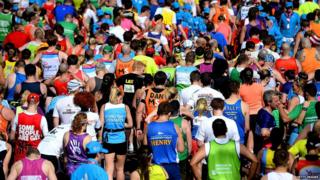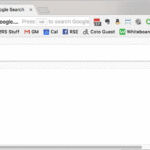‘Fraudulent’ charity runners condemned – BBC News
 Image copyright
Image copyright
Getty Images
The Great North Run has been held annually since 1981
Runners who did the Great North Run using charity places but did not raise any money have been described as “fraudulent” by the race organisers.
It is after a BBC investigation found 1,278 people who accepted places paid for by charities in 2017 were recorded as raising nothing.
That was despite promising to fundraise as a condition of their entry.
Organisers said they knew of a “small number of runners” who had cheated the system which they “absolutely condemn”.
The figures come from 42 charities who responded to a request for information from BBC Radio 4’s You and Yours.
Some of those who donated nothing are believed not to have taken part in the race because of illness or injury but others did cross the finish line.
A place in the Great North Run offered by a charity can be the only way in for runners who are not selected in the public ballot or who miss its deadline.
Minimum amount
If they accept a charity place they often have to pay the charity a registration fee, perhaps of £20 or £50, but also promise to raise a minimum amount of money.
Most runners hit or exceed their fundraising targets but some do not just miss them, they fail to raise anything at all.
Image copyright
Getty Images
Mo Farah won the 2017 race
The charity Epilepsy Action had 10 of its 93 runners raise nothing in 2017. Three of them withdrew before the race but seven of them completed it.
The charity’s fundraising events manager, Katie Reah, said they have not been able to get any explanations from those seven runners.
“Often when they don’t raise the sponsorship we tend not to see them at the finish either so they don’t come to the charity marquee.”
Extra costs
The donations are important because like many charities, Epilepsy Action receives no government funding and so relies upon people’s generosity to fund its work.
Each place in the Great North Run cost it over £110 in 2017, which is more than twice as much as an individual will have paid who secured a place through the public ballot.
It can cost charities more because they often buy packages which guarantee a certain number of places in the event, along with other benefits like marquees at the finish and adverts in the race magazine.
That is in addition to a standard race entry fee which they pay for each place.
On average, 17% of people who accepted Great North Run places in 2017 from these 42 charities were recorded as not raising any money.
Simon Ledsham from Cancer Research UK says the charity still made over £500,000 from the Great North Run in 2017
The highest proportion was reported by Cancer Research UK which also had the largest number of runners.
Of the 758 people who took its charity places, 318 (42%) raised nothing.
“We’re really keen to try to urge people when they’ve made that commitment to raise that money because it is vital to fund our research,” said Cancer Research UK’s director of communities, Simon Ledsham.
“We’ve introduced new methods of contacting the people that take our places, we’re increasing our level of telephone calls that we make to them to explain the commitment they’re making and the support that we have on offer to them to encourage them to raise the money.”
Still profitable
The Great North Run was still really profitable in 2017 for charities including Cancer Research UK and Epilepsy Action who say they really appreciate the efforts of the majority of runners who do keep their fundraising promises.
Charities do not insist on runners signing contracts making them personally liable if they fail to hit their fundraising targets because it might put off genuine fundraisers, according to Daniel Fluskey from the Institute of Fundraising.
“If somebody has taken a place and then they can’t participate in the event or they are not doing well with their fundraising, the main thing to do would be to speak to the charity because the charity can help them out or reassign that place if needed,” he said.
Daniel Fluskey is the head of policy and external affairs at the Institute of Fundraising
Help for Heroes was one of six charities that said all of their runners raised money in the 2017 Great North Run.
“We have a two-step fundraising target so if they reach their first fundraising target then they will get entry into the event,” said Louise Brimble, senior events manager at Help for Heroes.
“If they don’t reach that first fundraising target then unfortunately they won’t be able to take part.”
‘Fraudulent and damaging’
Some charities said that runners they recorded as raising nothing individually may in fact have raised money as part of a team.
Others said runners who raise nothing sometimes claim not to have taken part in an event when the race results suggest they have.
The problem is not unique to the Great North Run but charities say it tends to be more of an issue at events like it, where places are in high demand.
In a statement, The Great Run Company said: “We are aware of a small number of runners who exploit the charity system in the manner highlighted today, and absolutely condemn that practice, which is fraudulent, damaging for the charities involved, and goes against the spirit of the Great North Run.”
You can hear more on this story on You & Yours on BBC Radio 4 on Thursday 20 December just after 12:15pm.



